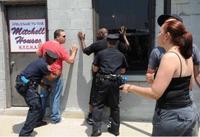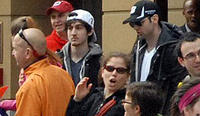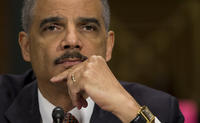-
Bloomberg vetoes bills aiming to curb NYPD’s stop-and-frisk
New York City mayor Michael Bloomberg vetoed two bills aiming to limit the NYPD’s stop and frisk policy. The policy has been criticized by civil rights advocates, and has also been highlighted by those opposing Police Commissioner Ray Kelly’s candidacy to replace Janet Napolitano as DHS secretary.
-
-
Giuliani says political correctness hampers fight against domestic terrorists
The Department of Defense initially described Army Major Nidal Hassan’s Fort Hood shooting spree as “terrorism,” but quickly changed that definition to “workplace violence.” Testifying before a congressional panel, former New York City mayor Rudy Giuliani criticized DoD’s decision, and political correctness more generally, saying that “You can’t fight an enemy you don’t acknowledge.”
-
-
The differences between impulsive and predatory murderers
A pioneering study finds distinct differences between two types of murderers: impulsive murderers and predatory, or premeditated, murderers. Impulsive murderers were much more mentally impaired, particularly cognitively impaired, while predatory or premeditated murderers exhibit deeper psychiatric disorders.
-
-
Gun-possession arrests reduce subsequent crimes involving firearms

Gun possession arrests made by a concentrated, proactive patrol unit in the Houston Police Department were linked to significant reductions in subsequent crimes involving firearms, a study finds.
-
-
White House finalizes executive actions on gun violence

The White House said President Obama is close to putting the final touch on several executive actions to address gun violence. White Officials said that these actions should be viewed as a substitute to legislative action.
-
-
DHS ordered to release names of immigrant criminals allowed to stay in U.S.
A federal judge has ordered DHS to release the names of thousands of criminal immigrants who were allowed to stay in the United States because their home countries refused to take them back. Two years ago, the Immigration and Customs Enforcement (ICE) released a list of more than 6,800 criminals, including 201 who were convicted of murder and other serious offenses, but the agency refused to provide names, saying that doing so would be a violation of the immigrants’ privacy. A judge ruled that the public interest in knowing how ICE handles aliens convicted of crimes is more important than the privacy concerns of the immigrants. The list of released criminal aliens now contains more than 8,500 names.
-
-
Justice Department endorses NYPD’s stop-and-frisk

The Justice Department (DOJ) has entered the debate on the New York Police Department’s stop-and-frisk policy, telling a federal judge that DOJ endorses the program as long as there is independent oversight to monitor changes in the policy if civil rights violations occur.
-
-
Bloomberg group presses lawmakers to close FBI’s gun “terror gap”
New York City mayor Michael Bloomberg’s group, Mayors Against Illegal Guns, has turned its attention to Senators Kelly Ayotte (R-New Hampshire), Jeff Flake (R-Arizona), and Max Baucus (D-Montana) to gain their support for a gun bill which would prevent people on the U.S. terrorist watch list from passing background checks for guns.
-
-
Former CIA chief: NYPD surveillance would have prevented Boston-like attacks

Former CIA director Michael Hayden said a terror attack like the Boston Marathon bombings would never have taken place in New York City. Hayden, who also headed the National Security Agency (NSA), said the New York Police Department’s (NYPD) broad campaign of spying on the Muslim communities in the city would have helped officials identify the radical tendencies of the alleged bombers, thus preventing the attack.
-
-
Letters containing ricin sent to Mayor Michael Bloomberg, gun-control advocacy group

Two letters sent to Mayor Michael Bloomberg – one to his office in New York, the second to the Washington, D.C. offices of Mayors Against Illegal Guns, a non-profit gun-control group he has founded — contained traces of the deadly poison ricin.
-
-
DHS: it is impossible to stop 3D plastic guns from getting past security checkpoints

A DHS intelligence bulletin starkly warns it may not be possible to stop 3D-printed guns from being made – or from getting past security checkpoints undetected. DHS notes that 3D-printed firearms can be made without serial numbers or unique identifiers, making ballistics testing difficult, and that advancements in technology and decreasing 3D printer costs will mean even more sophisticated printed guns will become easier to acquire.
-
-
FBI defends handling of Boston bombing, admits FBI-CBP miscommunication
FBI director Robert Mueller yesterday defended the way his agency handled the Russian request that the FBI pay attention to Tamerlan Tsarnaev in the months before the 15 April attack on the Boston Marathon. The two key junctures: following the FBI’s March 2011 investigation of Tamerlan, an investigation which found no ties between him and terrorism, the FBI twice, in September and October 2011, asked the Russian security services for more information about why the Russians suspected Tameraln, so the FBI could dig more deeply, but the Russians never responded. Still, the FBI went ahead and placed Tameraln’s name on a low-level watch list, which meant that his travel was tracked. The CBP Boston office, however, took no action in response to two FBI’s electronic messages – from January and June 2012 — about Tsarnaev’s travel to Russia.
-
-
DHS refuses FOIA requests for the Tsarnaev brothers’ immigration papers

DHS has rejected repeated FOIA requests for the federal immigration records of the Boston Marathon bombing suspects, as well as Immigration and Customs Enforcement’s records on Tamerlan Tsarnaev, saying they are still conducting an investigation.
-
-
Oakland wants to write its own gun control laws
The leaders of Oakland, California, say that state gun laws are not suitable for their crime-infested city. They want to write their own gun law, saying it would not ban guns, but would allow the city to have tighter controls on who owns and who is selling them and buying them.
-
-
U.S. secretly obtains AP phone records to identify source of story

In what the AP calls a “massive and unprecedented intrusion” into the news organization’s news work, the U.S. Justice Department secretly gathered two-months-worth of telephone records of the agency’s reporters and editors. The AP says the records listed incoming and outgoing calls to the offices and homes of reporters and editors. The Justice Department began collecting the phone records in order to identify the source or sources of a 7 May 2012 AP story which detailed a secret CIA operation in Yemen to intercept an al Qaeda-sponsored attempt to load an IED onto a U.S.-bound airplane.
-
More headlines
The long view
How Male Grievance Fuels Radicalization and Extremist Violence
Social extremism is evolving in reach and form. While traditional racial supremacy ideologies remain, contemporary movements are now often fueled by something more personal and emotionally resonant: male grievance.
